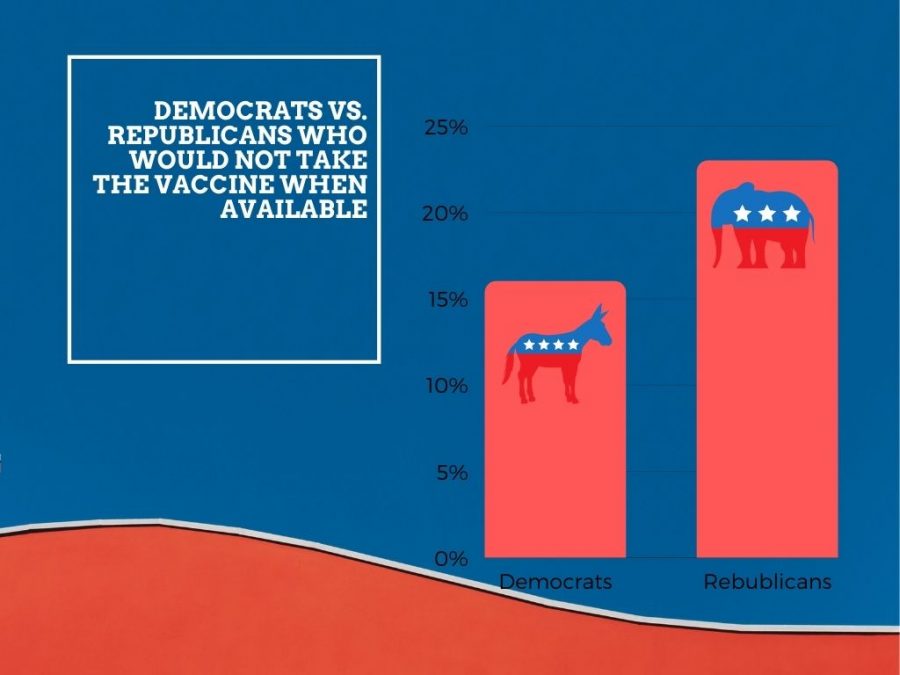Opinion: Pandemics and Infodemics, A 2020 Dilemma
With COVID on the rise, why do so little people trust a vaccine?
December 22, 2020
As the COVID-19 pandemic continues to rage across the world, people are searching for answers now more than ever. Everyday people scour the internet for anything that can make them feel safer, and more secure, and give them the peace of mind that they have the most up to date information. The information age has allowed us to reach the answers we crave during life in a pandemic. No longer do we have to wait for the evening news to hear what happened, today, yesterday, or in the last week. Simply going to Twitter or Facebook gives us the latest news in seconds- you can get news as it is happening, right in the palm of your hand. Sadly, living in this age also comes with a dire flip side. Another pandemic is sweeping, and it is a symptom of our age of information, we are also suffering through what experts have referred to as an “infodemic.”
The term “infodemic,” was first used by Washington Post writer David Rothkopf when describing misinformation in the time of another viral attack, the SARS epidemic that occurred in 2003. In essence, it describes a situation in which information (both correct and incorrect), conspiracies, rumors, and hearsay is widespread, and creates an environment where finding correct information is made substantially more difficult. In a pandemic ravaged world, this infodemic can have lethal effects. The largest effect that has been seen and noted by experts is the growing distrust in not just the government, but also the medical and scientific community. One recent movement that is contributing to this distrust is the growing number of anti-vaccine groups that have made social media platforms like Facebook their home. In an interview with Scientific Magazine, Neil Johnson, a physicist at George Washington University who studies the ebb and flow of these anti-vaccine groups, stated findings show that since the beginning of the pandemic, anti-vaccine groups have continued spouting unfounded and scientifically inaccurate conspiracy theories. They’ve also escalated their efforts in spreading these conspiracy theories on social media by filling various Facebook groups with even more theories. In the same study, Johnson learned that 10% of Facebook pages run by people with legitimate questions about the virus have adopted anti-vaccine perspectives due to this spread of disinformation.
Not only is it the scientifically uninformed who are being affected by the infodemic, but the general population at large has been impacted as well. A recent poll by the Associated Press found that less than 50% of Americans would receive the vaccine when it becomes available. How can this be? In part, it comes from misinformation straight from the top, with President Trump’s campaign openly downplaying the virus and adding more fuel to the fire in terms of misinformation. An example of how misinformation has real-world implications occurred in March of this year when an Arizona couple ingested a form of chloroquine- a chemical commonly found in fish tank cleaner- that at the time, President Trump had hailed as a “game changer” in the fight against the pandemic. Sadly the man suffered cardiac arrest and died, while his wife was admitted to hospital in critical condition. The correlation between events like this and misinformation from the top can’t be ignored. Additionally, data from the same study by the Associated Press found that 23% of Republicans would not take the vaccine when available, compared to the 16% of Democrats who would not take it.
Now that we know that COVID misinformation can be found around every corner, how can we as individuals combat it? Surprisingly, just knowing that this misinformation exists can make people more thoroughly question and analyze information they encounter. In practice, this is called “inoculation theory,” and takes cues from a real vaccination technique. In a real-world vaccine, you might be given a weak strand of a virus in order for your body to develop immunity to the stronger virus. The same occurs with information. Simply presenting the fact that misinformation occurs can help people adopt a more critical lens when analyzing any information. Another crucial step in combating COVID misinformation is to not share any false or misleading information on social media, whether it be making fun of it or in an attempt to debunk it. Social media algorithms will take note that such statements are popular, which in turn causes sites to push the information forward in an attempt to gain more media traffic. Instead, share accurate information straight from the source – the CDC, WHO, and the FDA are terrific places to start.
In the battle against COVID-19, information is the most powerful tool at everyone’s fingertips, and together we can make sure fewer and fewer people fall prey to ignorance and misinformation. Together, we can make a difference, and together, we can bring just a little bit of hope into our lives.








